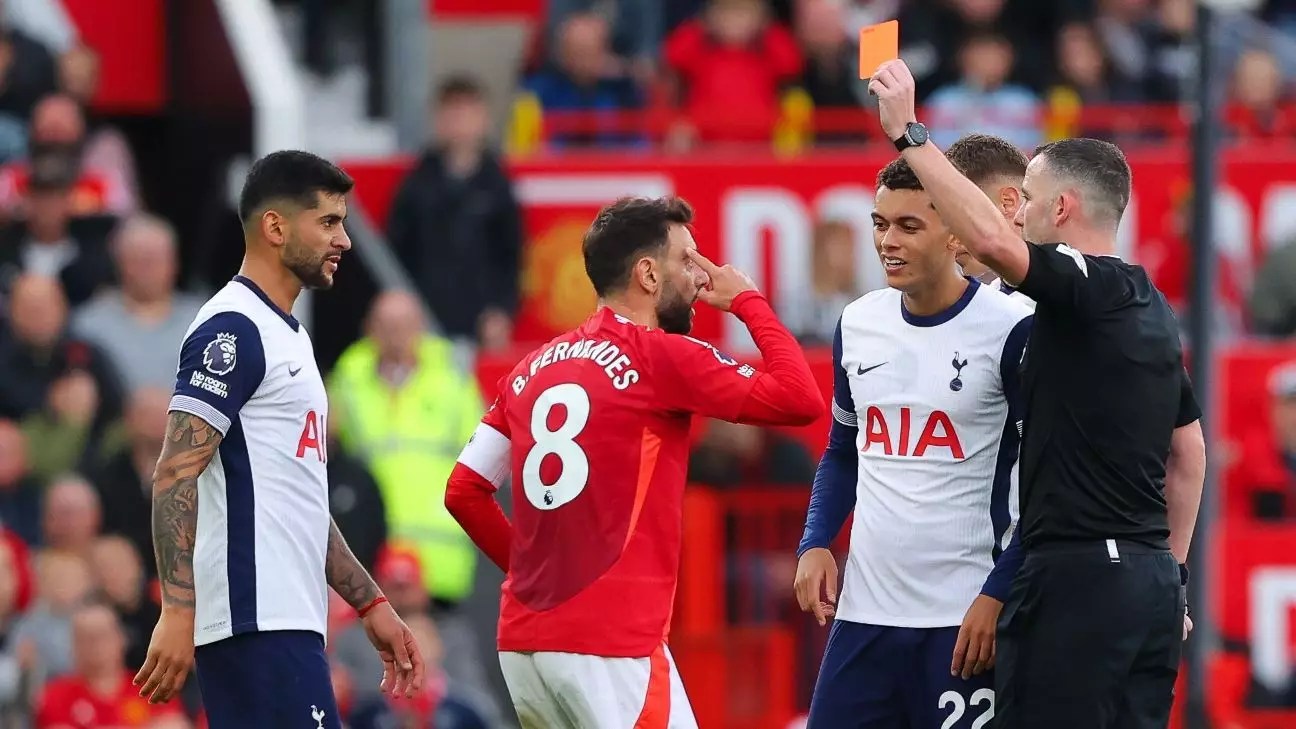In the din of Old Trafford on Sunday, Manchester United faced a disheartening defeat against Tottenham Hotspur, culminating in a 3-0 scoreline that left fans and players alike questioning the circumstances surrounding the match. At the center of the controversy was United captain Bruno Fernandes, who was sent off in the 42nd minute for a challenge that he vehemently criticized as unwarranted. His immediate post-match interview reflects a deeper crisis for United beyond just the red card – it raises questions about officiating consistency and team morale during challenging moments.
Upon reviewing the sequence leading to Fernandes’ dismissal, one notes that he seemingly slipped as he approached an oncoming tackle, a fact he emphasized in his post-match comments. The raising of his foot, which made contact with James Maddison’s shin, was deemed serious enough by referee Christopher Kavanagh to warrant a straight red card. However, the lack of intense contact was a point of contention for Fernandes. He argued that the incident did not merit such a severe punishment, suggesting that a yellow card would have sufficed. His assertion that even Maddison seemed to agree with him hints at a broader conversation regarding player safety versus officiating subjectivity in critical match moments.
Fernandes’ dismissal not only left Manchester United one man down but revealed deeper issues within the team structure. The captain himself reflected on the impact of his absence, acknowledging the uphill battle faced by his teammates in the match that followed. His openness about feeling responsible for the disadvantage illustrates a commitment to leadership that transcends the immediate consequences of a single game. Despite the heavy loss, Fernandes recognized the resilience demonstrated by his teammates, which could serve as both a morale booster and a point of focus as the season progresses.
Being the fourth United captain in Premier League history to be sent off at Old Trafford places Fernandes in a notable, albeit regrettable, category. The names of Roy Keane, Nemanja Vidic, and Wayne Rooney accompany him, underscoring a historical narrative of passionate leadership often crossed by the fervor of the game. However, this should also serve as a cautionary tale for the current squad, indicating that emotional leadership must be balanced with discipline. The notoriety of this statistic could also amplify scrutiny on United’s leadership and tactical approach going forward.
Ultimately, the episode surrounding Fernandes’ red card should catalyze reflection within Manchester United. Rather than viewing the loss solely through a lens of disappointment, it presents an opportunity for growth and adaptation. The team’s ability to regroup and learn from this experience could define their season ahead. The challenges faced on the pitch against Tottenham could spur improvements in coordination and strategic planning to cover vulnerabilities exposed by the numerical disadvantage.
As they aim to recover from this setback, Manchester United must find a way to emerge stronger, learning valuable lessons both in the context of officiating and their internal dynamics as a cohesive unit. The coming weeks will be crucial as they attempt to navigate both their performance and the mind games that often accompany high-stakes football.


Leave a Reply